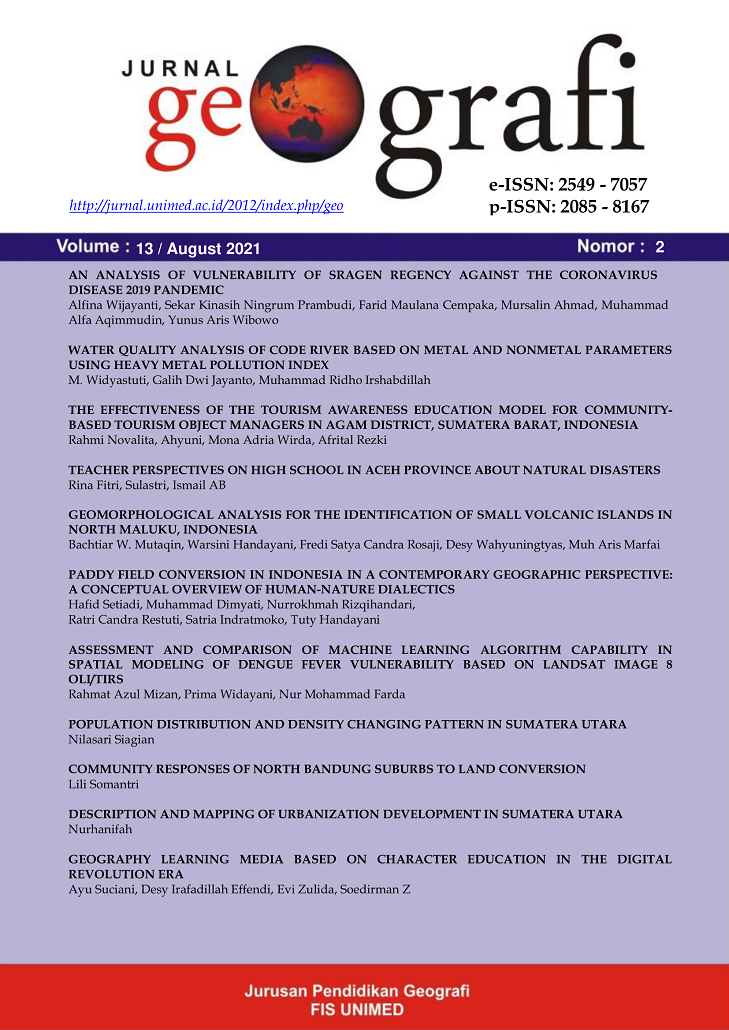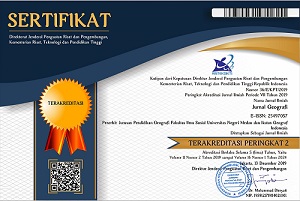ASSESSMENT AND COMPARISON OF MACHINE LEARNING ALGORITHM CAPABILITY IN SPATIAL MODELING OF DENGUE FEVER VULNERABILITY BASED ON LANDSAT IMAGE 8 OLI/TIRS
DOI:
https://doi.org/10.24114/jg.v13i2.21019Abstract
The spread of dengue fever in Indonesia has become a major health problem. Spatial modeling for the distribution of dengue fever vulnerability is an important step to support the planning and mitigation of dengue fever in Indonesia. This study aims to assess and compare the capability of two machine learning algorithms to create a spatial model of dengue fever vulnerability. The research was conducted in Baubau City, Southeast Sulawesi Province by taking 129 cases that occurred from 2015 to February 2016. In this study, the model was created using R software and machine learning algorithms including support vector machine (SVM) and random forest (RF). The six modeling variables involved include land use/cover, BLFEI, NDVI, LST, rainfall and humidity extracted from Landsat 8 OLI/TIRS imagery as well as BMKG (Meteorological, Climatological, and Geophysical Agency of Indonesia) and BWS climate data. The model's capability was assessed using the Area Under Curve-Receiver Operating Characteristic (AUC-ROC) curve. The results of the research show that both algorithms provide excellent model accuracy with AUC values of 1 for SVM and 0.997 for RF with SVM as the best algorithm for modeling dengue fever in Baubau City.Keywords: Machine Learning, Vulnerability, Dengue Fever, Landsat 8 ImageReferences
Adzan, G., & Danoedoro, P. (2012). Fuzzy Logic for Spatial Modelling DHF in Yogyakarta. Jurnal Bumi Indonesia, 1(3).
Bouhennache, R., Bouden, T., Taleb-Ahmed, A., & Cheddad, A. (2018). A New Spectral Index for the Extraction of Built-Up Land Features From Landsat 8 Satellite Imagery. Geocarto International, 1“21.
Statistic Indonesia of Baubau City. (2018). Baubau City in Figures 2018. https://doi.org/1102001.7472
National Standardization Agency (BSN). (2014). SNI 7645-1:2014 Landuse Classification - Part 1 : Medium and Small Scale.
Costa, E. A. P. de A., Santos, E. M. de M., Correia, J. C., & Alburquerque, C. M. R. de. (2010). Impact of Small Variations in Temperature and Humidity on the Reproductive Activity and Survival of Aedes aegypti (Diptera , Culicidae ). Revista Brasileira de Entomologia, 54(No. 3), 488“493.
Danoedoro, P. (2012). Digital Remote Sensing (B. R. W (ed.); 1st ed.). C.V ANDI OFFSET.
Dempsey, C. (2012). Where is the Phrase œ80% of Data is Geographic From?
Public Health Office of Southeast Sulawesi Province. (2018). Southeast Sulawesi Province Health Profile.
Ding, F., Fu, J., Jiang, D., Hao, M., & Lin, G. (2018). Mapping the Spatial Distribution of Aedes aegypti and Aedes albopictus. Acta Tropica, 178(August 2017), 155“162.
Fawzi, N. I. (2014). Surface Emissivity Mapping Using Vegetation Indices. Majalah Ilmiah Globë, 16(2), 133“139.
Ganie, M. A., & Nusrath, A. (2016). Determining the Vegetation Indices (NDVI) from Landsat 8 Satellite Data. International Journal of Advanced Research, 4(8), 1459“1463. https://doi.org/10.21474/ijar01/1348
Gubler, D. J. (2012). The Economic Burden of Dengue. Am. J. Trop. Med. Hyg, 86(5), 743“744.
Hidayatuloh, A. (2020). Introduction of R Programming and RStudio. https://bookdown.org/aepstk/intror/
Hijmans, R. J., & Elith, J. (2019). Spatial Distribution Models - R Spatial.
Iriani, Y. (2012). Relationship between Rainfall and Increase in Child Dengue Hemorrhagic Fever Cases in Palembang City. Sari Pediatri, 13(6), 378“383.
Kurniadi, H., Aprilia, E., Utomo, J. B., Kurniawan, A., & Safril, A. (2018). Comparison of IDW and Spline Methods in Interpolation of Rainfall Data (Case Study of Monthly Rainfall in East Java Period 2012-2016). GEOTIK Proceeding 2018, 215.
Lee, H., Kim, J. E., Lee, S., & Lee, C. H. (2018). Potential Effects of Climate Change on Dengue Transmission Dynamics in Korea. PLoS ONE, Vol. 13(No. 28, Juni 2018), 1“23.
Motevalli, A., Pourghasemi, H. R., & Zabihi, M. (2018). Assessment of GIS-Based Machine Learning Algorithms for Spatial Modeling of Landslide Susceptibility : Case Study in Iran. Comprehensive Geographic Information Systems, 266“268.
Ngoc Thach, N., Bao-Toan Ngo, D., Xuan-Canh, P., Hong-Thi, N., Hang Thi, B., Nhat-Duc, H., & Dieu, T. B. (2018). Spatial pattern assessment of tropical forest fire danger at Thuan Chau area (Vietnam) using GIS-based advanced machine learning algorithms: A comparative study. Ecological Informatics, 46(May), 74“85.
Nguyen, N. T., Dang, B.-T. N., Pham, X.-C., Nguyen, H.-T., Bui, H. T., Hoang, N.-D., & Bui, D. T. (2018). Spatial Pattern Assessment of Tropical Forest Fire Danger at Thuan Chau Area (Vietnam) using GIS-based Advanced Machine Learning Algorithms : A Comparative Study. Ecological Informatics, 46(March), 74“85.
Palaniyandi, M. (2014). The Environmental Aspects of Dengue and Chikungunya Outbreaks in India: GIS for Epidemic Control. International Journal of Mosquito Research, 1(2), 35“40.
Pineda-Cortel, M. R. B., Clemente, B. M., & Nga, P. T. T. (2019). Modeling and predicting dengue fever cases in key regions of the Philippines using remote sensing data. Asian Pacific Journal of Tropical Medicine, 12(2), 60“66.
R Foundation. (2020). What is R. https://www.r-project.org/about.html
Stevens, F. R., Gaughan, A. E., Linard, C., & Tatem, A. J. (2015). Disaggregating Census Data for Population Mapping Using Random Forests with Remotely-Sensed and Ancillary Data. PLoS ONE, 1“22. https://doi.org/10.1371/journal.pone.0107042
USGS. (2019). USGS EROS Archive - Landsat Archives - Landsat 8 OLI (Operational Land Imager) and TIRS (Thermal Infrared Sensor).
Valdez, L. D., Sibona, G. J., & Condat, C. A. (2018). Impact of Rainfall on Aedes aegypti Populations. Ecological Modelling, 385(November 2017), 1“27.
Adzan, G., & Danoedoro, P. (2012). Fuzzy Logic for Spatial Modelling DHF in Yogyakarta. Jurnal Bumi Indonesia, 1(3).
Bouhennache, R., Bouden, T., Taleb-Ahmed, A., & Cheddad, A. (2018). A New Spectral Index for the Extraction of Built-Up Land Features From Landsat 8 Satellite Imagery. Geocarto International, 1“21.
Statistic Indonesia of Baubau City. (2018). Baubau City in Figures 2018.
Breiman, L. (2001). Random Forest (R. E. Schapire (ed.); pp. 5“32). Kluwer Academic.
National Standardization Agency (BSN). (2014). SNI 7645-1:2014 Landuse Classification - Part 1 : Medium and Small Scale.
Coll, C., Galve, J. M., Sanchez, J. M., & Caselles, V. (2010). Validation of Landsat-7/ETM+ Thermal-Band Calibration and Atmospheric Correction With Ground-Based Measurements. IEEE Transactions on Geoscience and Remote Sensing, 48(1), 547“555.
Costa, E. A. P. de A., Santos, E. M. de M., Correia, J. C., & Alburquerque, C. M. R. de. (2010). Impact of Small Variations in Temperature and Humidity on the Reproductive Activity and Survival of Aedes aegypti (Diptera , Culicidae ). Revista Brasileira de Entomologia, 54(No. 3), 488“493.
Danoedoro, P. (2012). Digital Remote Sensing (B. R. W (ed.); 1st ed.). C.V ANDI OFFSET.
Dempsey, C. (2012). Where is the Phrase œ80% of Data is Geographic From?
Public Health Office of Southeast Sulawesi Province. (2018). Southeast Sulawesi Province Health Profile.
Ding, F., Fu, J., Jiang, D., Hao, M., & Lin, G. (2018). Mapping the Spatial Distribution of Aedes aegypti and Aedes albopictus. Acta Tropica, 178(August 2017), 155“162.
Fawzi, N. I. (2014). Surface Emissivity Mapping Using Vegetation Indices. Majalah Ilmiah Globë, 16(2), 133“139.
Ganie, M. A., & Nusrath, A. (2016). Determining the Vegetation Indices (NDVI) from Landsat 8 Satellite Data. International Journal of Advanced Research, 4(8), 1459“1463.
Gubler, D. J. (2012). The Economic Burden of Dengue. Am. J. Trop. Med. Hyg, 86(5), 743“744.
Hidayatuloh, A. (2020). Introduction of R Programming and RStudio. https://bookdown.org/aepstk/intror/
Hijmans, R. J., & Elith, J. (2019). Spatial Distribution Models - R Spatial.
Iriani, Y. (2012). Relationship between Rainfall and Increase in Child Dengue Hemorrhagic Fever Cases in Palembang City. Sari Pediatri, 13(6), 378“383.
Kamimurai, K., Matsusei, I. T., Takahashii, H., Komukaii, J., Fukuda, T., Suzuki, K., Aratani, M., Shirai, Y., & Mogi, M. (2002). Effect of Temperature on the Development of Aedes aegypti and Aedes albopictus. The Japan Society of Medical Entomology and Zoology, 53(No. 1), 53“58.
Ministry of Health of the Republic of Indonesia. (2017). The Situation of Dengue Fever Disease in Indonesia in 2017.
Ministry of Health of the Republic of Indonesia. (2019, February). DHF Cases Continue to Increase. PSN. 1“2.
Kurniadi, H., Aprilia, E., Utomo, J. B., Kurniawan, A., & Safril, A. (2018). Comparison of IDW and Spline Methods in Interpolation of Rainfall Data (Case Study of Monthly Rainfall in East Java Period 2012-2016). GEOTIK Proceeding 2018, 215.
Lawrence, R. L., Wood, S. D., & Sheley, R. L. (2006). Mapping invasive plants using hyperspectral imagery and Breiman Cutler classifications (randomForest). Remote Sensing of Environment, 100(3), 356“362.
Lee, H., Kim, J. E., Lee, S., & Lee, C. H. (2018). Potential Effects of Climate Change on Dengue Transmission Dynamics in Korea. PLoS ONE, Vol. 13(No. 28, Juni 2018), 1“23.
Liaw, A., & Wiener, M. (2002). Classification and Regression by randomForest. R News, 2(3), 18“22.
Motevalli, A., Pourghasemi, H. R., & Zabihi, M. (2018). Assessment of GIS-Based Machine Learning Algorithms for Spatial Modeling of Landslide Susceptibility : Case Study in Iran. Comprehensive Geographic Information Systems, 266“268.
Mountrakis, G., Im, J., & Ogole, C. (2011). Support vector machines in remote sensing: A review. ISPRS Journal of Photogrammetry and Remote Sensing, 66(3), 247“259.
NASA. (2019). Landsat Science Education. http://landsat.gsfc.nasa.gov/?p=5186
Ngoc Thach, N., Bao-Toan Ngo, D., Xuan-Canh, P., Hong-Thi, N., Hang Thi, B., Nhat-Duc, H., & Dieu, T. B. (2018). Spatial pattern assessment of tropical forest fire danger at Thuan Chau area (Vietnam) using GIS-based advanced machine learning algorithms: A comparative study. Ecological Informatics, 46(May), 74“85.
Nguyen, N. T., Dang, B.-T. N., Pham, X.-C., Nguyen, H.-T., Bui, H. T., Hoang, N.-D., & Bui, D. T. (2018). Spatial Pattern Assessment of Tropical Forest Fire Danger at Thuan Chau Area (Vietnam) using GIS-based Advanced Machine Learning Algorithms : A Comparative Study. Ecological Informatics, 46(March), 74“85.
Palaniyandi, M. (2014). The Environmental Aspects of Dengue and Chikungunya Outbreaks in India: GIS for Epidemic Control. International Journal of Mosquito Research, 1(2), 35“40.
Pineda-Cortel, M. R. B., Clemente, B. M., & Nga, P. T. T. (2019). Modeling and predicting dengue fever cases in key regions of the Philippines using remote sensing data. Asian Pacific Journal of Tropical Medicine, 12(2), 60“66.
R Foundation. (2020). What is R. https://www.r-project.org/about.html
Stevens, F. R., Gaughan, A. E., Linard, C., & Tatem, A. J. (2015). Disaggregating Census Data for Population Mapping Using Random Forests with Remotely-Sensed and Ancillary Data. PLoS ONE, 1“22. https://doi.org/10.1371/journal.pone.0107042
Swets, J. A. (1988). Measuring the Accuracy of Diagnostic Systems Linked references are available on JSTOR for this article : Measuring the Accuracy of Diagnostic Systems. Science, 240(4857), 1285“1293. http://www.jstor.com/stable/1701052
Tiong, V., Abd-jamil, J., Nellis, S., Fauzi, R., & AbuBakar. (2015). Evaluation of land cover and prevalence of dengue in Malaysia. Tropical Biomedicine, 32(4), 587“597.
USGS. (2019). USGS EROS Archive - Landsat Archives - Landsat 8 OLI (Operational Land Imager) and TIRS (Thermal Infrared Sensor).
Valdez, L. D., Sibona, G. J., & Condat, C. A. (2018). Impact of Rainfall on Aedes aegypti Populations. Ecological Modelling, 385(November 2017), 1“27.
Vanwambeke, S. O., Lambin, E. F., Eichhorn, M. P., Flasse, S. P., Harbach, R. E., Oskam, L., Somboon, P., Beers, S. van, Benthem, B. H. B. van, Walton, C., & Butlin, R. K. (2007). Impact of Land-use Change on Dengue and Malaria in Northern Thailand. EcoHealth, May 2014.
WHO. (2007). International Health Regulations ( 2005 ) Areas of Work for Implementation. In World Health Organization (Issue June). http://apps.who.int/iris/bitstream/10665/69770/1/WHO_CDS_EPR_IHR_2007.1_eng.pdf?ua=1
WHO. (2019). Neglected tropical diseases. https://www.who.int/neglected_diseases/en/
Widayani, P. (2010). Spatial Modeling of Dengue Hemorrhagic Fever Epidemiology Using Geographic Information System in Depok District, Sleman Regency, Yogyakarta. Jurnal Geografi Gea, 10(2).
Widayani, P., Yanuar, R., & H, A. Y. (2018). Relationship Analysis of Environmental Factor Change on the Dengue Fever Diseases Using Image Transformation ( Case Study : Surakarta City ). IOP Publising, 169(July), 1“10.
Wilder-Smith, A., Ooi, E. E., Horstick, O., & Wills, B. (2019). Dengue. The Lancet, 393(10169), 350“363.
World Economic Forum. (2017). Global Shapers Survey. In World Economic Forum. http://www.shaperssurvey2017.org
Yue, Y., Sun, J., Liu, X., Ren, D., Liu, Q., Xiao, X., & Lu, L. (2018). International Journal of Infectious Diseases Spatial Analysis of Dengue Fever and Exploration of Its Environmental and Socio-Economic Risk Factors using Ordinary Least Squares : A Case Study in Five Districts of Guangzhou City , China, 2014. International Journal of Infectious Diseases, 75(No. 27 Juli 2018), 39“48.























